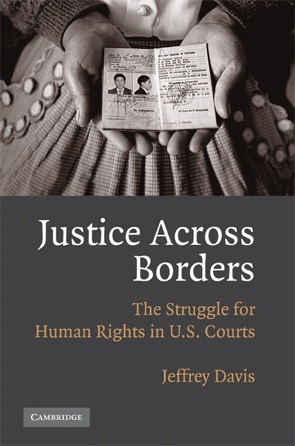From The Law and Politics Book Review:
“Justice Across Borders is an in-depth and fascinating examination of human rights litigation in American courts…. [It] is a detailed, well-researched, carefully analyzed, and cogently argued book; it answers pivotal questions on how [the Alien Tort Statute] has become a new tool in overcoming territorial limitations in pursuing international human rights violations very thoroughly and in a highly readable and engaging manner. I have made this book required reading for my seminar on international human rights….”
Srini Sitaraman, Associate Professor
Government and International Relations,
Clark University
From Humanities and Social Sciences:
“Jeffrey Davis, a lawyer and political scientist, has written an important book that traces the development of human rights law under the Alien Tort Statute (ATS), the crucial role of nongovernmental organizations (NGOs) in creating and litigating these cases, and the implications such cases have for relations among government branches and with other nations…. This text is excellent in inviting discussion of law and litigation generally, and in the field of human rights more specifically. What is a lawsuit for? Should courts defer to the executive branch, largely entrusted with the conduct of foreign policy, or is it important that courts should hold the executive accountable for its decisions? Could lawsuits against U.S. corporations lead to a worsening of standards, as they withdraw from some areas for fear of suit, to be replaced by more callous foreign corporations? …Davis has made a valuable contribution that brings together scholarship from political science and human rights law.”
Paul Parker, Professor of Political Science
Truman State University
From Harvard Law Review
“In this interesting and arresting book, Professor Jeffrey Davis details both the legal maneuverings of ATS plaintiffs in U.S. courts and the tragic circumstances that lead them there in the first place. Professor Davis frames his analysis around the numerous players - from the Supreme Court and the executive branch to NGOs and private corporations - whose interactions in the U.S. legal system have shaped modern ATS case law. He succeeds in painting a detailed and instructive portrait of the role these various entities can play in human rights litigation, and he provides a thoughtful analysis of the many complex legal issues that such litigation entails. In the end, Professor Davis's project is a hopeful one, detailing how U.S. courts in the wake of Filartiga have provided a real and meaningful forum for many victims who had no opportunity in their home countries to bring their oppressors to justice.”
---
“Justice Across Borders makes a tremendous contribution to the field of human rights. It moves beyond a strictly legalistic approach to human rights and exposes the full range of actors and the complex politics informing the development of human rights jurisprudence in U.S. courts. Well researched and tightly argued, the book offers particularly strong analysis of NGO involvement and executive branch involvement, and yet it deserves to be read from cover to cover by both students and practitioners seeking to understand the historical development of human rights claims in U.S. courts. The human rights field is moving towards increasing use of courts. Justice Across Borders will prove to be a useful text for years to come.”
Julie Mertus
Associate Professor and Co-Director of the Ethics, Peace and Global Affairs Program
The American University,
School of International Service
“In Justice Across Borders, Jeffrey Davis makes an indispensable and innovative contribution to the study of human rights and the growing literature on international justice. Mixing detailed case studies with quantitative analysis, Davis reveals the transformative role of litigation in the search for justice. He also reminds us that individuals – from survivors of mass atrocities to the public interest lawyers who represent them – play an essential role in this search.”
William J. Aceves, Associate Dean for Academic Affairs
California Western School of Law
"A compelling account of how a little-known statute from 1789 spawned a human rights revolution, and a nuanced analysis of the forces that have driven -- and opposed -- that transformation."
David Cole
Professor of Law
Georgetown University

